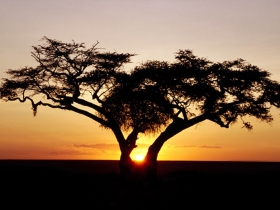Africa Agrees on Secret Climate Damages Demand

By
Barry Malone
ADDIS ABABA, Nov 17 (Reuters) - African leaders agreed on Tuesday on how
much cash to demand from the rich world to compensate for the impact of
climate change on the continent but kept the figure secret ahead of next
month's Copenhagen talks.
The United Nations summit in Denmark will try to agree on how to counter
climate change and come up with a post-Kyoto treaty protocol to curb
emissions.
"We have set a minimum beyond which we will not go," Ethiopian Prime
Minister Meles Zenawi, who will represent Africa at the talks, told
reporters. "But I am not in a position to tell you what that minimum
figure will be."
Exhaustive preparatory talks since 2007 have failed to solve splits
between rich and poor countries or find extra funds to help developing
nations to pay for expensive technology to ensure they do not over
pollute as their economies grow.
"There are many calculations including up to the $100 billion (a year)
mark that has been set by some experts. We will be very flexible," Meles
said.
Poor nations want rich countries to cut emissions by 40 percent from
1990 levels by 2020. But some in the West complain that such cuts are
not realistic, especially so soon after the global economic downturn.
So far, promises by the rich fall short, at cuts of about 11 to 15
percent.
THREATENED WALKOUT
Fearing that the talks may fail, Denmark last week said it would ask
world leaders to come for the final two days of the Dec. 7-18 conference
to push for a deal at the meeting, originally meant for environment
ministers.
Meles -- who has threatened a walkout of the 52 African nations he will
represent -- said his priorities at the talks would be to ensure carbon
emissions are reduced and to secure a fair yearly compensation amount
for Africa.
The Ethiopian leader was speaking in Addis Ababa at a meeting of an
African Union (AU) committee of 10 nations charged with agreeing a
common position.
Aid workers say a five-year drought, worsened by climate change, is
afflicting 23 million people in east Africa, with Ethiopia worst
affected.
Kenya's President Mwai Kibaki and Ugandan President Yoweri Museveni also
attended the last session the AU group will have before next month's
talks.
Meles said Africa wanted a treaty to be agreed in Copenhagen but could
accept a "binding political agreement" as a steppingstone to a treaty
being agreed later.
The Geneva-based Global Humanitarian Forum says poor nations bear more
than nine-tenths of the human and economic burden of climate change.
The 50 poorest countries, however, contribute less than 1 percent of the
carbon dioxide emissions that scientists say are threatening the planet,
it says.
© Thomson Reuters 2009 All rights reserved
